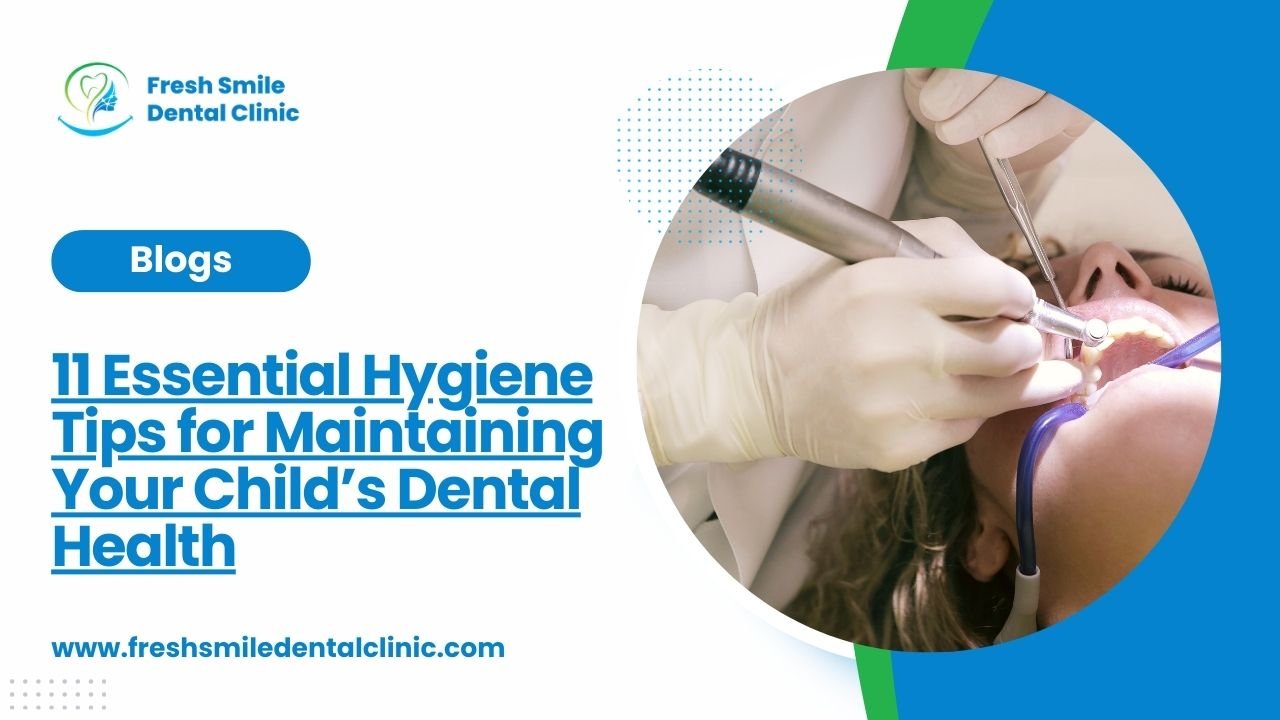11 Hygiene Tips for Dental Health
Oral hygiene plays a crucial role in the overall health and well-being of your child. Teaching them good dental habits from a young age is essential for preventing dental issues and ensuring a bright smile for years to come. In this blog post, we will discuss 11 important hygiene tips for parents to keep their child’s teeth healthy and strong. These tips are easy to follow and will help your child develop good oral care habits that will last a lifetime.
Start Early
The journey to healthy teeth begins even before your child’s first tooth emerges. You can gently clean your baby’s gums with a clean, damp cloth after each feeding. Once the first tooth appears, usually around six months of age, switch to a soft infant toothbrush. Starting early helps your child become accustomed to the routine of oral care.
Choose the Right Toothbrush
Selecting the right toothbrush for your child is crucial. Opt for a soft-bristled toothbrush with a small head that’s designed for children. Make sure the toothbrush has a comfortable grip for your child to hold. Replace the toothbrush every three months or sooner if the bristles become frayed.
Use a Child-Friendly Toothpaste
When your child is around two years old and can spit, introduce them to a fluoride toothpaste. Use only a pea-sized amount of toothpaste, as excessive fluoride ingestion can lead to dental fluorosis. Teach your child to spit out the toothpaste after brushing.
Establish a Brushing Routine
Consistency is key in maintaining good dental hygiene. Set a regular brushing schedule for your child, ideally twice a day – once in the morning and once before bedtime. Make brushing a fun and engaging activity by singing songs or using colorful toothbrushes.
Supervise Brushing
Young children often lack the dexterity to brush their teeth effectively. Until your child is around seven or eight years old, it’s essential to supervise their brushing routine to ensure they are cleaning all surfaces of their teeth and not swallowing toothpaste.
Floss Daily
Flossing is as important as brushing, as it helps remove food particles and plaque from between the teeth where a toothbrush can’t reach. Begin flossing your child’s teeth as soon as they have two teeth that touch. Use child-friendly floss picks or a gentle flossing thread.
Encourage Healthy Eating Habits
A balanced diet not only benefits your child’s overall health but also their dental health. Limit sugary snacks and beverages, as they can contribute to tooth decay. Encourage your child to eat a variety of fruits, vegetables, and dairy products, which provide essential nutrients for strong teeth.
Say No to Sugary Drinks
Sugary drinks like soda and fruit juices can be harmful to your child’s teeth. The sugar in these beverages combines with bacteria in the mouth to create acid, which erodes tooth enamel. Opt for water or milk as the primary beverages for your child.
Limit Snacking
Frequent snacking can increase the risk of tooth decay. Try to limit between-meal snacks, and if your child does snack, choose healthy options like cheese, yogurt, or fresh fruits and vegetables. Avoid sticky or sugary snacks that can cling to the teeth.
Visit the Dentist Regularly
Regular dental check-ups are essential for your child’s oral health. Schedule your child’s first dental appointment around their first birthday, and then follow the dentist’s recommendations for subsequent visits. Dental professionals can detect and address issues early on, ensuring your child’s teeth remain healthy.
Lead by Example
Children often learn by observing their parents, so it’s crucial to lead by example. Maintain your own oral hygiene routine and make it a family affair. Brush and floss together to show your child that dental care is a shared and essential part of daily life.
Teach Proper Brushing Technique
While supervising your child’s brushing, ensure they are using the correct technique. Teach them to brush in small, circular motions rather than scrubbing back and forth, as this can damage the enamel. Emphasize the importance of brushing all surfaces of the teeth, including the front, back, and chewing surfaces.
Use a Timer
To ensure your child brushes for the recommended two minutes, consider using a timer. Many toothbrushes designed for children come with built-in timers or colorful sand timers that make brushing more fun. You can also play their favorite song, and have them brush until the song ends.
Reward Good Oral Hygiene
Positive reinforcement can go a long way in encouraging your child to maintain good oral hygiene. Create a reward system where your child earns stickers, small toys, or special treats for consistent brushing and flossing. This can make dental care more enjoyable for them.
Be Mindful of Teething
During the teething phase, some children may experience discomfort and increased drooling. Providing a clean, cool teething ring or a damp washcloth to chew on can help soothe their gums. Be sure to maintain good oral hygiene even during teething to prevent potential dental issues.
Address Thumb-Sucking and Pacifier Use
Thumb-sucking and prolonged pacifier use can affect the alignment of your child’s teeth and jaw. If your child has these habits, discuss them with your dentist, who can provide guidance on how to help your child break the habit gently.
Encourage Drinking Water
Water is not only crucial for overall health, but it’s also great for dental health. Encourage your child to drink water throughout the day, especially after consuming sugary or acidic foods or drinks. Water helps rinse away food particles and reduce the acidity in the mouth.
Monitor Fluoride Intake
Fluoride is beneficial for preventing tooth decay, but excessive fluoride can lead to dental fluorosis, which may affect the appearance of the teeth. Be mindful of other sources of fluoride, such as fluoridated water and supplements, to ensure your child is getting the right amount.
Be Prepared for Emergencies
Accidents can happen, and it’s essential to be prepared for dental emergencies. Have a dental first aid kit on hand that includes gauze, a small container with a lid, and the phone number of your dentist. In case of a knocked-out tooth, you can store it in milk or saliva and seek immediate dental care.
Educate Your Child
As your child grows, involve them in discussions about oral health. Explain the importance of good dental care and how it contributes to a beautiful smile and overall well-being. Teach them about the consequences of neglecting oral hygiene, such as cavities and gum disease.
Stay Informed
Dental recommendations and guidelines may change over time. Stay informed about the latest developments in pediatric dentistry by regularly consulting with your child’s dentist or reading reliable sources of dental health information. This will help you make informed decisions regarding your child’s oral care.
Conclusion: 11 Hygiene Tips for Dental Health
Incorporating these additional tips into your child’s dental hygiene routine will further enhance their oral health. Remember that patience, consistency, and a positive attitude are essential when teaching your child good dental habits. By following these 21 hygiene tips and being a supportive role model, you can ensure your child maintains healthy teeth and enjoys a lifetime of beautiful smiles. Dental care isn’t just about having a perfect smile; it’s about promoting overall well-being and confidence in your child’s life.
Read Also:
Teeth and Gum Care for Infants and Toddlers.
Crown and Bridge Restorations.
Composite Fillings vs Amalgam Fillings.
Managing Dental Anxiety in Children.
Fluoride Treatments and Dental Sealants: Against Tooth Decay in Kids.
Treating Gum Disease with Laser Therapy.
Precision and Accuracy in Laser Dentistry.
11 things an adult can do to maintain good oral health.
11 things that makes your teeth weak.
11 Nighttime Tips for Maintaining Healthy Teeth and Gums.




